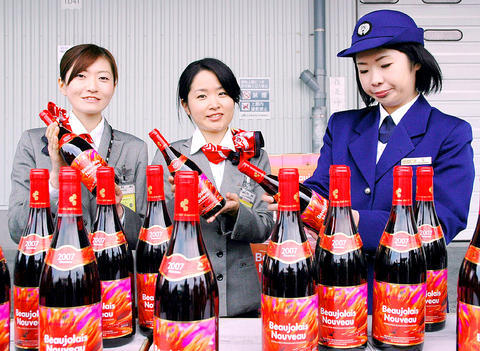The first batch of 2007 Beaujolais Nouveau arrived in Japan yesterday, but shipments were set to drop sharply amid signs that the country's love affair with the wine was waning.
Japan is the biggest importer of Beaujolais Nouveau, ordering 11 million bottles last year.
But the strength of the euro has pushed up prices and shipments are expected to plunge more than 20 percent this year, importers said.

WARNING: EXCESSIVE ALCOHOL CONSUMPTION CAN DAMAGE YOUR HEALTH
Wine fans in Japan will gather at bars and restaurants on Thursday for an annual ritual to crack open the fruity light red wine.
That date marks the official uncorking of the new season's Beaujolais, with the Japanese the first in the world to get a taste because of their country's time zone.
Wine still accounts for only a fraction of the alcohol purchased in hard-drinking Japan but consumption has more than doubled in the past decade, spurred by heavy marketing.
The Beaujolais boom, however, has been losing some of its momentum in recent years.
Japanese imports hit a record high of 12.5 million bottles in 2004 but demand has since cooled.
This year, Japan is expected to import 8.4 million bottles, according to Asahi Breweries Ltd, one of the Japanese importers of the wine.
"The boom has calmed down and demand has stabilized," a spokesman for the company said. "We presume that many people are choosing quality rather than quantity."
Another importer, Suntory, said the weakness of the yen against the euro may also be partly to blame.
"A strong euro may also be a negative factor for sales of Beaujolais Nouveau," a spokesman said.
The price of this year's imports are about five percent higher than last year because of the strong euro against the yen, Asahi said.
Almost half of the 2006 Beaujolais Nouveau vintage was sold abroad, with Japan coming first, followed by Germany and the US.

MORE VISITORS: The Tourism Administration said that it is seeing positive prospects in its efforts to expand the tourism market in North America and Europe Taiwan has been ranked as the cheapest place in the world to travel to this year, based on a list recommended by NerdWallet. The San Francisco-based personal finance company said that Taiwan topped the list of 16 nations it chose for budget travelers because US tourists do not need visas and travelers can easily have a good meal for less than US$10. A bus ride in Taipei costs just under US$0.50, while subway rides start at US$0.60, the firm said, adding that public transportation in Taiwan is easy to navigate. The firm also called Taiwan a “food lover’s paradise,” citing inexpensive breakfast stalls

TRADE: A mandatory declaration of origin for manufactured goods bound for the US is to take effect on May 7 to block China from exploiting Taiwan’s trade channels All products manufactured in Taiwan and exported to the US must include a signed declaration of origin starting on May 7, the Bureau of Foreign Trade announced yesterday. US President Donald Trump on April 2 imposed a 32 percent tariff on imports from Taiwan, but one week later announced a 90-day pause on its implementation. However, a universal 10 percent tariff was immediately applied to most imports from around the world. On April 12, the Trump administration further exempted computers, smartphones and semiconductors from the new tariffs. In response, President William Lai’s (賴清德) administration has introduced a series of countermeasures to support affected

CROSS-STRAIT: The vast majority of Taiwanese support maintaining the ‘status quo,’ while concern is rising about Beijing’s influence operations More than eight out of 10 Taiwanese reject Beijing’s “one country, two systems” framework for cross-strait relations, according to a survey released by the Mainland Affairs Council (MAC) on Thursday. The MAC’s latest quarterly survey found that 84.4 percent of respondents opposed Beijing’s “one country, two systems” formula for handling cross-strait relations — a figure consistent with past polling. Over the past three years, opposition to the framework has remained high, ranging from a low of 83.6 percent in April 2023 to a peak of 89.6 percent in April last year. In the most recent poll, 82.5 percent also rejected China’s

PLUGGING HOLES: The amendments would bring the legislation in line with systems found in other countries such as Japan and the US, Legislator Chen Kuan-ting said Democratic Progressive Party (DPP) Legislator Chen Kuan-ting (陳冠廷) has proposed amending national security legislation amid a spate of espionage cases. Potential gaps in security vetting procedures for personnel with access to sensitive information prompted him to propose the amendments, which would introduce changes to Article 14 of the Classified National Security Information Protection Act (國家機密保護法), Chen said yesterday. The proposal, which aims to enhance interagency vetting procedures and reduce the risk of classified information leaks, would establish a comprehensive security clearance system in Taiwan, he said. The amendment would require character and loyalty checks for civil servants and intelligence personnel prior to